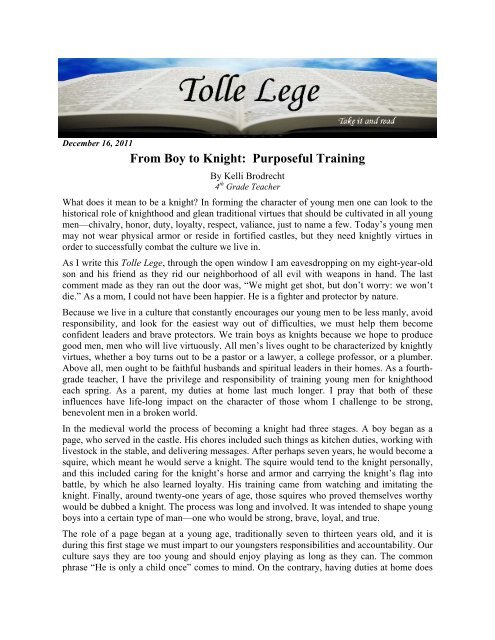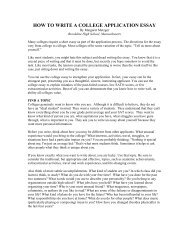From Boy to Knight: Purposeful Training - The Geneva School
From Boy to Knight: Purposeful Training - The Geneva School
From Boy to Knight: Purposeful Training - The Geneva School
Create successful ePaper yourself
Turn your PDF publications into a flip-book with our unique Google optimized e-Paper software.
December 16, 2011<strong>From</strong> <strong>Boy</strong> <strong>to</strong> <strong>Knight</strong>: <strong>Purposeful</strong> <strong>Training</strong>By Kelli Brodrecht4 th Grade TeacherWhat does it mean <strong>to</strong> be a knight? In forming the character of young men one can look <strong>to</strong> thehis<strong>to</strong>rical role of knighthood and glean traditional virtues that should be cultivated in all youngmen—chivalry, honor, duty, loyalty, respect, valiance, just <strong>to</strong> name a few. Today’s young menmay not wear physical armor or reside in fortified castles, but they need knightly virtues inorder <strong>to</strong> successfully combat the culture we live in.As I write this Tolle Lege, through the open window I am eavesdropping on my eight-year-oldson and his friend as they rid our neighborhood of all evil with weapons in hand. <strong>The</strong> lastcomment made as they ran out the door was, “We might get shot, but don’t worry: we won’tdie.” As a mom, I could not have been happier. He is a fighter and protec<strong>to</strong>r by nature.Because we live in a culture that constantly encourages our young men <strong>to</strong> be less manly, avoidresponsibility, and look for the easiest way out of difficulties, we must help them becomeconfident leaders and brave protec<strong>to</strong>rs. We train boys as knights because we hope <strong>to</strong> producegood men, men who will live virtuously. All men’s lives ought <strong>to</strong> be characterized by knightlyvirtues, whether a boy turns out <strong>to</strong> be a pas<strong>to</strong>r or a lawyer, a college professor, or a plumber.Above all, men ought <strong>to</strong> be faithful husbands and spiritual leaders in their homes. As a fourthgradeteacher, I have the privilege and responsibility of training young men for knighthoodeach spring. As a parent, my duties at home last much longer. I pray that both of theseinfluences have life-long impact on the character of those whom I challenge <strong>to</strong> be strong,benevolent men in a broken world.In the medieval world the process of becoming a knight had three stages. A boy began as apage, who served in the castle. His chores included such things as kitchen duties, working withlives<strong>to</strong>ck in the stable, and delivering messages. After perhaps seven years, he would become asquire, which meant he would serve a knight. <strong>The</strong> squire would tend <strong>to</strong> the knight personally,and this included caring for the knight’s horse and armor and carrying the knight’s flag in<strong>to</strong>battle, by which he also learned loyalty. His training came from watching and imitating theknight. Finally, around twenty-one years of age, those squires who proved themselves worthywould be dubbed a knight. <strong>The</strong> process was long and involved. It was intended <strong>to</strong> shape youngboys in<strong>to</strong> a certain type of man—one who would be strong, brave, loyal, and true.<strong>The</strong> role of a page began at a young age, traditionally seven <strong>to</strong> thirteen years old, and it isduring this first stage we must impart <strong>to</strong> our youngsters responsibilities and accountability. Ourculture says they are <strong>to</strong>o young and should enjoy playing as long as they can. <strong>The</strong> commonphrase “He is only a child once” comes <strong>to</strong> mind. On the contrary, having duties at home does
not mean a child cannot play. <strong>The</strong> two are not mutually exclusive. Playing is an important par<strong>to</strong>f growing up; so is learning <strong>to</strong> be responsible for more than just oneself. In an adult role, menare expected <strong>to</strong> work <strong>to</strong> provide for their families, lead their homes, contribute <strong>to</strong> themaintenance and well-being of their house, and hopefully sustain an active role as husband,father, and church member. All of these duties require a man <strong>to</strong> step outside of his owninterests and think of others. Remarkably, giving a young boy responsibilities that contribute <strong>to</strong>the overall well-being of his home is the first step in training. Examples of duties at homemight include taking out the trash, folding laundry, washing windows, washing tile flooring,emptying the dishwasher, vacuuming. <strong>The</strong> list is endless for each household. <strong>The</strong> goal is <strong>to</strong> beconsistent and <strong>to</strong> require a high standard of achievement. If his chores are not done correctly,they should be done again. You are training him <strong>to</strong> set that high standard for himself. Toaccomplish a task well leaves him with the proud feeling of contributing <strong>to</strong> the greater good.A young boy must also be trained in the traditions of the faith. For example, Scripture andcatechisms are often memorized at this young age. Much of what is memorized at this age canbe recalled at a later age when the mind of the boy is ready for deeper understanding of hisfaith. In addition, a young man must be trained in basic chivalry, which means that he mustlearn <strong>to</strong> tend <strong>to</strong> the needs of females in his life and treat them with respect and honor. Simplesteps like carrying bags, opening doors, and showing preference <strong>to</strong> the fairer sex will put himon his way <strong>to</strong>ward self-sacrificing service <strong>to</strong>ward his future wife. A young boy’s life isbursting with opportunity <strong>to</strong> be trained and molded in<strong>to</strong> a godly young man.As a boy matures, his duties must mature with him. A teenager who is still doing the task of aneight-year-old does not see himself as a contribu<strong>to</strong>r in his household. A squire’s role was muchdifferent than a page’s. A squire served a knight and learned from him. He was trained bywatching the knight’s example and by performing duties that helped the knight. Our fourthgradershave the privilege of being assigned a high school knight <strong>to</strong> serve for eight weeks. <strong>The</strong>squire serves the needs of the knight and watches him daily in order <strong>to</strong> learn the ways ofmanhood. Presumably, the teenage boy has already learned much from role models in his ownlife—contributing <strong>to</strong> the home in a way that pleases his father and helping him with his tasks,tasks that include greater responsibility and show more independence. He is growing instrength and can use these new muscles for service in his home. In a modern home, tasks mayinclude yard work, gutter cleaning, household repairs, pressure washing, car maintenance, orother tasks where he can prove himself. That is what the teenage boy seeks above all else—<strong>to</strong>prove himself as capable and trustworthy. In a modern home, tasks may include yard work,gutter cleaning, household repairs, pressure washing, car maintenance, or other tasks where hecan prove himself capable and trustworthy.A teen boy also needs more time being trained in what it means <strong>to</strong> be a man of God. His mindneeds <strong>to</strong> be fed with God’s word, church tradition, and theology. He should be readingScripture daily, as well as books by church fathers. His mind should be continually shaped bythe input of his father as well as leaders in his church. He is no longer content recitingcatechisms and creeds but needs <strong>to</strong> understand and embrace these truths with guidance andconsistent help. Along with these, he needs <strong>to</strong> develop an understanding of a properrelationship with young ladies. He can learn <strong>to</strong> implement true chivalric behavior by beingheld accountable for his interactions with the females in his life. He must be taught <strong>to</strong>discipline his desires by the encouragement of others who have gone before him. He isdeveloping quickly through these years, and they are the final teachable moments before he
leaves his home <strong>to</strong> be his own knight.Part of <strong>The</strong> <strong>Geneva</strong> <strong>School</strong>’s vision is <strong>to</strong> be “a formidable force in the expansion andenrichment of Christ’s kingdom, in the life both of the individual and of the world.” In aculture that is producing young men who are selfish relativists capable of rationalizing anybehavior, we are fighting against the grain <strong>to</strong> produce the antithesis. Our goal is <strong>to</strong> train futureemployers, employees, husbands, and fathers who understand responsibility, compassion,integrity, and other respectable attributes that stand out in a culture that is being swept theother direction. Character formation begins at a young age and must be purposefully guidedand fostered <strong>to</strong> independence in order <strong>to</strong> combat the world’s view.Before a fourth-grade squire is dubbed a knight, he must memorize and recite a Code ofChivalry before his teacher, his class, and his assigned high school knight. Let us diligentlystrive <strong>to</strong> imprint upon our young men these values that will allow them <strong>to</strong> let their light soshine before men that others may see their good works and glorify their father in heaven.Code of ChivalryI pledge by my oath <strong>to</strong> be loyal of hand and of mouth, seeking <strong>to</strong> serve every man as best I may.Seeking the fellowship of good men, hearken un<strong>to</strong> their words and remember them.Be humble and courteous wherever I go, not talking much, neither being dumb al<strong>to</strong>gether.Allow no woman or child <strong>to</strong> suffer by my default,so that if I may lift my hand <strong>to</strong> assist one, do so.If I must draw my sword <strong>to</strong> defend them, I do so un<strong>to</strong> my own death.If I come in<strong>to</strong> fellowship with boys or men who speak in a disrespectful manner <strong>to</strong> any woman or maiden,I will let them know in gracious words that this displeases me and my Lord,then depart their company forthwith.I vow <strong>to</strong> defend and protect those who seek <strong>to</strong> worship in the name of the Lord Jesus Christand promote faith in Him throughout this earth He has made.Author Unknown






